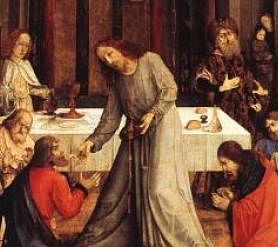258. Here Comes the Son: The Trinity and the Eucharist
Philosophy is pushed to its limits to provide rational explanations of two Christian theological doctrines.
Themes:
• L. Bianchi (ed.) L'eucaristia nella tradizione orientale e occidentale (Venice: 2007).
• D. Burr, Eucharistic Presence and Conversion in Late Thirteenth-Century Franciscan Thought (Philadelphia: 1984).
• R. Cross, Duns Scotus on God (Aldershot: 2005).
• G. Emery, The Trinitarian Theology of St Thomas Aquinas, trans. F.A. Murphy, (Oxford: 2007).
• J.C. Flores, Henry of Ghent: Metaphysics and the Trinity (Leuven: 2006).
• R.L. Friedman, Medieval Trinitarian Thought from Aquinas to Ockham (Cambridge: 2010).
• R.L. Friedman, Intellectual Traditions at the Medieval University: the Use of Philosophical Psychology in Trinitarian Theology among the Franciscans and Dominicans, 1250–1350, 2 vols (Leiden: 2013).
• M. McCord Adams, Some Later Medieval Theories of the Eucharist (Oxford: 2010).







Comments
Talking about heresises
… to live in Germany and pinning for almond croissants is utter blasphemy! Why to long for something so inferior when semmel is available? Aren't philosphers supposed to be rational?
In reply to Talking about heresises by Matěj Cepl
Semmeln
Actually my local bakery makes great almond croissants. And I actually eat plenty of Semmeln - many more than I do croissants, in fact. But I didn't want to make all the non-German listeners jealous.
In reply to Semmeln by Peter Adamson
Semmeln
Surely comparing Semmeln and almond croissants is a category error?
Nature of conversion
I’m glad you mentioned Siger of Brabant and the problems of whether God can directly intervene in something where he otherwise acts through secondary causes. Though it is curious to me, and probably accidental, that you refer to “transformation” of the elements into the eucharist. The point seems to be that none of the natural conversions (transformation, annihilation, etc.) work! That seems to be the first step and something we can all accept before moving on to the inner workings of transubstantiation.
The Eucharist in Abelard
At 17:10 - "Here Aquinas makes another bold proposal, namely that accidents can survive in the absence of the substances to which they belong"
It seems this idea was actually put forward over a century earlier by Peter Abelard. This may have been in Abelard's lost Sentences mentioned by Bernard of Clairvaux, and we also know about it from the Disputations against Peter Abelard by William of St. Thierry, who explains it before trying to refute it.
The reason I remembered this is that it plays a central role in James Hannam's God's Philosophers. According to Hannam, Abelard's use of Aristotelian logic to explain the Eucharist was pivotal in the establishment of scholasticism, because it persuaded the previously ambivalent Church that logic and reason (as identified with Aristotle) were valid ways to arrive at the truth, and could be useful in support of theology, making this the decisive moment in the embrace of reason by Catholic philosophy. I like that theory, though I don't know enough to judge how true it is.
In reply to The Eucharist in Abelard by Zarl
Abelard and the Eucharist
Yes, that rings a bell actually. But Aquinas would not have known Abelard's view on this right?
In reply to Abelard and the Eucharist by Peter Adamson
Lanfranc and Abelard and the Eucharist
Actually I just checked and Hannam didn't attribute it to Abelard, but to Lanfranc, apologies. I don't know where I got the Abelard part from, though the other sources I gave are correct, so he did hold that view. However, no matter who first came up with it, the part I wonder most about is whether it can really be credited for the development of scholasticism, the Church's initial acceptance of Aristotle, and the prestige that logic gained in Western scholarship.
If the explanation did originate with Lanfranc, it was in his De corpore et sanguine Domini, as part of his dispute with Berengar. But I'm not sure since other secondary sources speak of him merely opposing substance and form, without explicit reference to Aristotle's accidents. I couldn't get my hands on the original text. But whether it was Lanfranc or Abelard, it seems that view already had a long tradition in Paris before Aquinas, so my admittedly not so educated guess is he must have known about it, especially if it had anything near the impact that Hannam ascribes to it already starting in the 11th century.
Add new comment